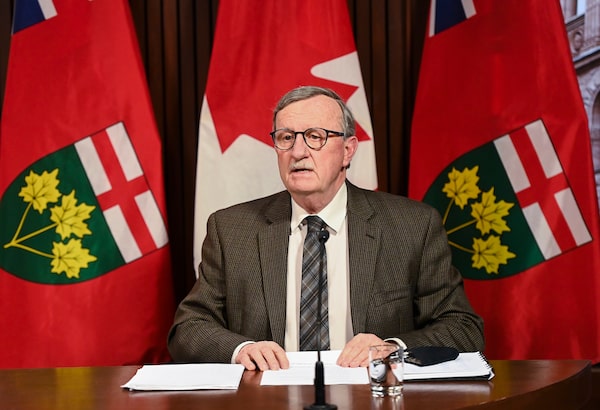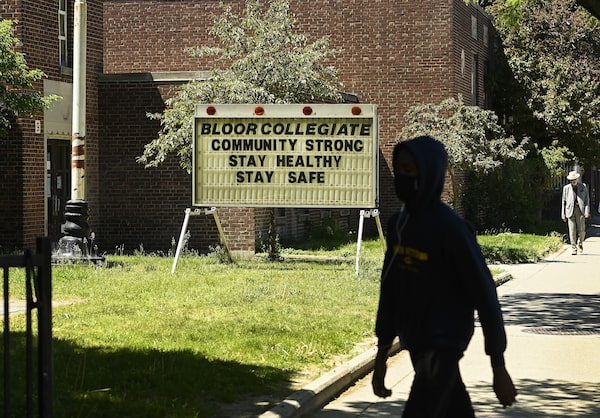
Ontario's Chief Medical Officer of Health Dr. David Williams, pictured April 1, 2021, during a press conference, where the province released its latest COVID-19 modelling.Nathan Denette/The Canadian Press
Media reports say Ontario is replacing its chief medical officer of health more than a year into the COVID-19 pandemic.
Multiple anonymous sources told the Toronto Star that Kieran Moore will replace David Williams as the province’s top doctor.
Toronto’s CityNews issued a similar report.
Dr. Moore currently heads up the Kingston, Frontenac, Lennox and Addington Public Health Unit.
Representatives from the premier’s office, the Ministry of Health and the Kingston-area public health unit did not immediately respond to the Canadian Press’s requests for comment.
Dr. Williams has faced much criticism over his handling of the COVID-19 pandemic.
Ontario to extend expiry of some AstraZeneca doses
Ontario received permission from Health Canada to extend the expiry of some doses of the Oxford-AstraZeneca vaccine on Saturday, saving thousands of shots from potentially going to waste.
A spokeswoman for Health Minister Christine Elliott said the change means doses with an original expiry of May 31 can now be used until July 1.
“Health Canada has issued an authorization to extend the expiry date of specific lots of the AstraZeneca COVID-19 vaccine from six months to seven months, following the review of submitted stability data,” Alexandra Hilkene said in a statement.
Pharmacies and physicians offices had been rushing to administer thousands of shots this weekend ahead of their previous Monday expiry date to avoid wasting doses.
Ontario had been trying to redistribute a stockpile of 45,000 shots expiring on May 31 and 10,000 more going bad in June.
But quality checks held up the delivery of thousands of the shots, and many didn’t reach their final destinations until Friday.
The head of the Ontario Pharmacists Association said Health Canada’s decision is not unprecedented when it comes to evolving data associated with a new vaccine.
“It’s good news,” Justin Bates said. “Although I do appreciate this is going to create a lot more questions … so people can continue to make an informed consent decision.”
Bates said pharmacies in different parts of Ontario had ramped up efforts to get shots into arms and avoid wasting any doses, and those efforts will continue.
“It does give us a longer runway and reduces the risk of any (waste), which I think is a good thing and that’s the silver lining in all of this,” he said.
The province paused the use of the AstraZeneca vaccine earlier this month due to an increase in reports of rare but deadly blood clots. It started offering it again this week as a second shot to people who received the dose between March 10 and March 19 at pharmacies in Toronto, Windsor and Kingston, and at some primary care offices.
Approximately 90,000 people participated in an AstraZeneca pilot between March 10 and March 19.
Ontario can safely reopen schools on a regional basis, science advisers say

A teenager walks past Bloor Collegiate Institute school in Toronto, closed to in-person learning like the rest of Ontario's schools, on May 27, 2021.Nathan Denette/The Canadian Press
Ontario’s COVID-19 science table said Saturday that the province can re-open schools safely on a regional basis while still limiting the risk of further virus transmission.
The new advice comes in response to Premier Doug Ford’s request for input on whether or not the province should reopen schools as cases trend downward across the province.
The group said some regions could reopen based on the advice of local medical officers of health and continued adherence to public health measures.
“We believe that Ontario can re-open schools safely on a regional basis to mitigate the significant short and long-term harms arising from school closures, while managing the risk of virus transmission in this sector,” the group said in a letter to Ford released Saturday.
The province closed schools in April as COVID-19 cases surged and Ford has said he wants a consensus on the issue from stakeholders before making a decision.
Ford wrote to those experts and education stakeholders Thursday, giving them a day and a half to respond to a series of questions on the possible reopening of classrooms for in-person learning.
The premier has said he doesn’t want to rely solely on the advice of the province’s top public health official, Dr. David Williams, who believes students should return to the classroom.
“I know very clearly where Dr. Williams stands,” Ford said Friday. “But I want the scientists to weigh in. I want to make sure the teachers’ unions weigh in. I want other educational workers to weigh in. I don’t want to rush this.”
The science table said in Saturday’s report that the closure may be harming some students’ physical and mental health and reopening would allow schools to re-establish contact with teachers and peers.
“This deterioration is now evident in the form of increased ambulatory care use and hospital admissions, most poignantly for children and youth with eating disorders,” the report said.
“We believe these mental health indicators represent the tip of the iceberg and that children and youth mental health will present significant long-term challenges during our recovery from the pandemic.”
The science table recently said reopening schools could cause COVID-19 case rates to rise between six and 11 per cent.
But the group said Saturday it now believes the resulting case increases from re-opening schools would be small and most public health units feel that they can manage those increases.
“Schools that re-open should maintain their public health measures vigorously and build on the strategies they have already deployed to limit spread,” they said.
The group also called on the province to use the summer to improve school ventilation and continue efforts to vaccinate students.
The letter from the province’s science advisers was co-signed by 10 other groups including the Ontario Medical Association, The Hospital For Sick Children and the Council of Ontario Medical Officers of Health.
Ontario reports 1,057 new COVID-19 infections, 15 new virus-related deaths
Ontario is reporting 1,057 new cases of COVID-19 Saturday and 15 more deaths linked to the virus.
Health Minister Christine Elliott says there are 228 new infections in Toronto and 178 in Peel Region.
She says there are also 82 new cases in York Region and 71 in Hamilton.
The data is based on 33,559 completed tests.
The Ministry of Health says 934 people are in hospital because of COVID-19, with 626 in intensive care and 438 on a ventilator.
The province says 148,972 doses of a COVID-19 vaccine were administered since Friday’s report for a total of over 8.8 million doses.
Quebec has 410 new COVID-19 cases, hospitalizations down to 373
Quebec is reporting 410 new cases of COVID-19 Saturday and seven more deaths related to the virus, including one in the last 24 hours.
Health officials say hospitalizations dropped by 12 for a total of 373.
The number of patients in intensive care held steady at 91.
The province says it administered 95,505 doses of vaccine on Friday, for a total of 5,405,885 since the start of the immunization campaign.
The province says about 59.1 per cent of Quebecers have received at least one dose.
Elsewhere in Canada
- Alberta is reporting that the number of patients with COVID-19 in the province’s hospitals has fallen to 478. There were 517 virus patients in hospitals the day before, and the number has been trending down. The government has said if there are fewer than 500 people in hospital two weeks from now, at the same time the latest vaccinations take full effect, it will lift an array of health restrictions on June 10. Alberta is also reporting 406 additional COVID-19 cases and eight new deaths linked to the virus.
- Saskatchewan officials say there were 179 new COVID-19 cases and one additional virus-related death. The province’s daily pandemic update says the person who died was in their 50s and was from the Regina zone. The update says Saskatchewan has now passed 700,000 vaccines administered. As of Saturday, second-dose vaccinations are open to residents 70 or older, or anyone who received their first shot before March 15.
- Officials in Newfoundland and Labrador are reporting nine new confirmed cases of COVID-19 today. They have identified six cases in the province’s western health region, two in the eastern region and one in the central health region. There are four people in hospital due to the virus, and the province is reporting 100 known active cases. Officials say they are still trying to identify the source of infection in the central region where there is a cluster of 60 confirmed COVID-19 cases.
- Manitoba is logging three new deaths of residents with COVID-19. Its daily COVID-19 update says two of those who died were men in their 20s from the Winnipeg health region, while the third was a man in his 70s from the Prairie Mountain health region. The update says 357 new cases of the virus have been identified over the past 24 hours. On Friday, health officials in Manitoba announced one of the biggest one-day jumps in COVID-19 numbers since the pandemic began, with 497 new cases.
- Nova Scotia is reporting four new deaths related to COVID-19 and 33 new cases of the virus Saturday. Officials say two men in their 80s and a woman in her 70s have died in the Halifax area, along with a man in his 80s in the western zone. The province says the single-day death total is the highest since six deaths were reported on May 3rd of last year. There are 566 known active cases of COVID-19 in Nova Scotia and 43 people in hospital, including 18 in intensive care.
- Health officials in New Brunswick say just over 60 per cent of residents aged 12 and older have received a first dose of a COVID-19 vaccine. Officials say more than 46,000 people have been at least partially immunized in the past week. The province is also reporting 10 new cases of the virus Saturday. Five cases have been identified in the Moncton region, four in the Fredericton area and one in the Bathurst region. The province has 143 known active infections with seven people hospitalized, including six in New Brunswick and one out of province. Two patients are in intensive care, including one patient in the province and the patient hospitalized in another province.